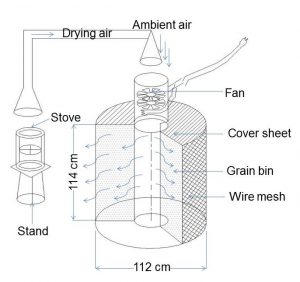Comparing small scale drying options
Download the complete publication PDF from ADMI: Small Scale Batch Dryers for Developing and Underdeveloped Countries
Open-air sun drying
Capacity: limited by space
Drying time: depends on weather conditions, 2 to 5 days
Crops: any
Fuel: solar
Portable? not applicable
Performance considerations: grain needs to be shifted periodically to improve drying.
Bubble dryer
Capacity: 500 or 1,000 kg
Drying time: Reducing moisture by .5 percent every hour for rice or corn in good conditions. With optimal conditions, a crop can be brought from 22 to 14 percent moisture in 6 to 8 hours, according to the manufacturer.
Crops: tested for rice and maize
Fuel: solar or electric options available
Portable? yes, can be rolled up and transported easily
Ease of construction: professional
Product available for purchase? Yes, from GrainPro at the link below.
Performance considerations: grain should be mixed regularly for optimum drying.
An instructional setup video is available here.
See FAQ from the International Rice Research Institute (IRRI) for more information.
Bin dryer
Circular bin dryers ventilate the grain outwards from a center column. They are compact, save floor space, and can be expanded or contracted to accommodate different batch sizes.

STR bin dryer
Capacity: 500 kg and up, bin can be expanded to more than 500 kg
Drying time: 500 kg of paddy dried from 24.75% to 8.5% moisture content in 7.5 hours. Time can depend on air temperature and blower speed.
Crops: rice, maize
Fuel: Electricity needed for blower, heat generated by burning rice briquettes or LP gas
Portable? yes, can be disassembled and transported
Ease of construction: some technical expertise required
Directions available for download? yes
Performance considerations: grain should be mixed regularly for optimum drying
Flat bed dryer
In the flatbed dryers, grain is laid out on a perforated screen, and dried by forcing heated air from below. A fan provides the drying air. A furnace provides drying heat. Loading and unloading the bed is done manually. Multiple versions of the flat bed dryer have been developed for use by smallholders.

Vietnamese flatbed dryer
This classic simple flatbed dryer was developed in Vietnam. It can be constructed in 4-ton (SGH4) or 8-ton (SGH8) configurations.
Capacity: 4 or 8 tons per batch depending on configuration
Crops: paddy, maize
Drying time: reduce moisture by about 1.5% per hour; 4 ton batch of paddy dried from 25% to 15% in 9-11 hours
Fuel: generator or electricity connection for fan and additional biomass furnace for heat
Performance considerations: grain needs to be mixed by hand; cover over the dryer allows use in more weather conditions.
Portable? no
Ease of construction: no technical expertise required
Directions available for download? Yes
SRA flat bed dryer
This dryer is an incremental upgrade to a conventional unidirectional flow flatbed dryer by introducing the principle of airflow-reversal drying. The reversible air dryer adds a cover to a standard flatbed dryer and an air channel to allow the operator to force air from the top down or from the bottom up. By reversing the airflow, these dryers reduce the moisture differential between the topmost and bottommost layers of grain, thereby increasing the consistency in drying.
Capacity: 500 kg up to 12 tons
Drying time: reduce moisture by about 1.15% per hour; an 8-ton batch of paddy can be dried from 24% to 12.5% moisture content in 9-11 hours.
Crops: paddy, whole coffee, coffee bean, pulped coffee, peanuts
Fuel: generator or electricity connection for fan and additional biomass furnace for heat
Portable? no
Performance considerations: Due to reverse flow drying, grain does not need to be mixed.
Collapsible flatbed dryer
The Easydry M500 dryer is a small collapsible flatbed dryer designed to be portable, unlike the conventional flatbed. In addition to portability, it differs from the conventional flatbed dryer by using a heat exchanger after the blower, so that clean air is blown through the grains to be dried.
Capacity: 500 or 1,000 kg
Drying time: for 500 kg, the dryer can reduce moisture by about 1.6% per hour; a batch of maize can be dried from 17% to 13% moisture content in 2.5 hours.
Crops: paddy, whole coffee, coffee bean, pulped coffee, peanuts
Fuel: generator or electricity connection for fan and additional biomass furnace for heat
Portable? yes
Performance considerations: Grain needs to be mixed frequently.
Ease of construction: technical expertise required
Directions available for download: yes
Flatbed drying wagon
The Flatbed Wagon Dryer is a completely self-contained mobile flatbed dryer, which is commercially available. This dryer can be shipped into a standard 20-foot shipping container anywhere in the world. It is designed for precision drying and contains a thermo-humidistat, which regulates the heater to bring the product to the desired moisture content..
Capacity: 215 bushels and 315 bushels
Drying time: reduce moisture by about 1.67% per hour; the 215 bushel dryer takes about 3 hours per 5% moisture reduction.
Crops: maize, but steel mesh can be customized to accommodate finer grains including flaxseed, rice, and wheat
Fuel: electricity
Portable? yes
Ease of construction: professional production required
Performance considerations: No grain mixing necessary. Difficult to use in poor electricity supply situations. Sides are 9 feet high, which could make loading difficult.

